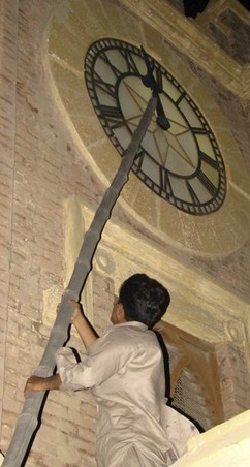Adil Najam
 As of the stroke of midnight Saturday-Sunday (May 31-June 1, 2008) Pakistan officially advanced its clocks by one hour. This “daylight savings” move is a bid to conserve energy in an increasingly energy strapped economy in conditions where everyone agrees that the energy situation is going to get worse well before it gets any better.
As of the stroke of midnight Saturday-Sunday (May 31-June 1, 2008) Pakistan officially advanced its clocks by one hour. This “daylight savings” move is a bid to conserve energy in an increasingly energy strapped economy in conditions where everyone agrees that the energy situation is going to get worse well before it gets any better.
The change puts Pakistan six hours ahead of the GMT. This change will last for three months; June-August.
Dawn reports that:
the energy conservation package approved by the Federal Cabinet on May 14 also envisages that during the next three months (June-August), all shopping plazas will close business after 9 p.m. and switch over their weekly holidays from Sunday to Friday, while industries will similarly stagger their weekly offs; WAPDA will not supply power to billboards using lights besides management of street lights. Under Cabinet’s directive the use of air conditioners will be stopped from 8 a.m. to 11 a.m. in Prime Minister House, Secretariat and other government offices, while one million energy saver bulbs will be purchased to promote culture of installing such bulbs across the country. The government has already set up a task force to control line losses.
The energy situation in Pakistan is precarious indeed. The economic loss that is being caused by it has to be immense. In all major cities, one seems to spend the entire day waiting for or recovering from the last load-shedding. Indeed, the economic working day in Pakistan is better described as the few hours of electricity in an otherwise electricity-less day, rather than by the hours of load-shedding within a “normal” flow of electricity.
The economic loss has to be measured not only by the economic value that is lost because of the lack of electricity, but also but the resources that are being diverted towards the expenditures necessitated by the new “load-shedding economy.” Those who can afford to, and many who can not, are being forced to spend obnoxious amounts of ineffective, uneconomical, noisy and polluting generators. Those who cannot, try out UPS solutions and the markets are flooded by over-priced and under-performing Chinese “rechargeable” lights and fans (some with built-in radios and other gimmicks). Most, however, have no options but to get used to the new status quo where people are already beginning to describe th day not by how many hours of load-shedding they have but by how many hours of electricity they get!
So, is “daylight savings” the answer? Or, at least, part of the answer?
 The history and reality of the idea of daylight savings is itself a fascinating one. The book, Spring Forward: The Annual Madness of Daylight Saving Time by Michael Downing, is a most fascinating account of the history and efficacy of the idea and it is not clear just how useful – if at all – the concept has been in actually saving energy.
The history and reality of the idea of daylight savings is itself a fascinating one. The book, Spring Forward: The Annual Madness of Daylight Saving Time by Michael Downing, is a most fascinating account of the history and efficacy of the idea and it is not clear just how useful – if at all – the concept has been in actually saving energy.
To look on the bright side, the decision shows that a certain seriousness has emerged in Pakistan to think seriously about conservation solutions. Everyone seems honestly interested in it. And, quite clearly, conservation has to be a key step. However, this along with the other steps in the new Energy Conservation Plan, even if appropriate, seem like an inadequate attempt to respond to a crisis that demands much more bold strategies.
A simple chronicle of just some of the many posts ATP has carried on the topic shows just how serious a crisis we are in and how much worse it is likely to become:
The Violence of Energy Insecurity
KESC, Karachi and Power Outages
Multiple Crises in Pakistan
Karachi Suffering the Heat
Bijli Bachao Mohem!
Andhair Nagri
Bijli Nama



















































The daylight time adjustment was exercised a few years back as well and failed miserably. It could not attract the public acceptance at all. The people were confused and were always referring to the dual timings, saying,
I do notice a positive impact of daylight savings in North America so I think it is a great idea.
However I am not sure what role is daylight savings going to play in cities like Karachi where most business dont start until 12 pm any way which is quite a nuisance.
There’s bound to be a lot of confused people in the next few days – especially the poor who couldn’t care less tbh.
Starting the day an hour earlier – in this sunny summer – when the shopkeepers start at 10 0r 11 AM, and extending their hours would certainly save some energy.
However, the deed is cast in the form of an order. No one has explained to the people – neither the government nor the Media – as to whay this is being done and what are the advantages.
Therefore, rumours run rampant and confusions prevail. The Muezzins in mosques are confused as to when to start their calls.
What a communications disaster in this prevailing age of Print and TVs.
It is a good idea if the Constitution of Pakistan is also amended to add the clause, “We shall do everything that is done in the United States of America.” Did our frequent guests like Richard Boucher and John Negroponte instruct our leaders to do so?
Seriously, though, I don’t see how much energy it would save – the DST, I mean. An hour will be taken off from one end and added to the other.
There are so many other ways that Pakistan can improve the energy situation rather than band-aid remedies.
One is political: Given the low energy demand of Pakistan (less need for home heating oil, fewer cars, etc), enough cheap, if not free, petrofuel can be obtained from Iran, a neighbour. But that would require not angering Iran by sitting in the lap of its enemy and our Uncle, Sam of America. If we were to distance ourselves from the belligerent attitude toward Iran, I’m sure we could get some immediate help. (How much has the US helped us with respect to energy independence)
Brazil has a lesser population and technological knowhow than Pakistan’s in general. But she is almost energy independent. What they use for their vehicles and machines is “alcool”, for “alcohol”. The crop of sugar cane (“ganna”) does well there as it does in Pakistan. Brazilians use microbial fermentation of cane sugar to generate lots of ethanol, which even the US has recently begun to employ as a supplement to their vehicular fuels. Pakistan may not have been blessed with land as fertile as the Amazon basin, but considering the benefits we can reap, even costly irrigation may be a sensible option.
So instead of meetings with US envoys like Richard Armitage who reportedly threatened Prez. Musharraf after 9/11 that Pakistan should get ready to be “bombed into the stone age” (“with friends like these who needs enemies”), we should arrange a bilateral summit with President Lula da Silva of Brazil and his engineers. Short-term goals should be chalked out, to later turn into permanent cooperation toward independence.
Similarly, given the hot temperatures of Pakistan, one can develop other biofuels – biodiesel and straight vegetable oil, like I do with my car :) In my case, I obtain used vegetable oil from restaurants after they’ve fried stuff in it and run my car off of it for free! It runs easily in warm temperatures but in the cold, the cooking oil has to be preheated with a countercurrent exchange system installed within the car – easy to make with a few everyday materials. The car runs better, with less or no smoke and with less engine noise. Besides, it’s earth friendly ‘coz it’s carbon-neutral or -negative, since it’s from recent photosynthesis by plants – soy, pea nut, corn, etc. Corn does very well in Pakistan. BTW, only combustion (diesel), not ignition, engines use this biofuel. The restaurant oil can also be used to heat homes in the winter – the only problem is some after-smell. It’s like slightly overdone pop corn, not like French Fries as you might have heard :)
US Democratic presidential candidate Obama, the self-proclaimed candidate of “change”, is keen to develop cellulosic ethanol, which, when perfected, might solve the world’s energy crisis, at least for a while. But that is years, if not decades, away from practical use. Pakistani Universities could do well to begin research along that direction *now*, instead of waiting for the US to develop it first and then to start begging it from them. There are bacteria which degrade cellulose – the constituent of leaves, wood, etc. – into sugar, which can be fermented by yeast and bacteria into ethanol – clean fuel. Remember that WE are forbidden to drink it, I don’t think there’s any injunction about it regarding cars :)
Former US Democatic presidential candidate and energy secretary Bill Richardson was reportedly working with some people, including a Pakistani, on alternative biofuels using very high oil-yielding plants. We can benefit from such new ideas for Pakistan.
A partial solution to the food crises that follow energy shortages is for Pakistanis to grow their own vegetables to save a few rupees. There’s almost always a yard in pakistani rural homes. (Also, remember the earlier ATP post on wastefulness, as in weddings?) Sorry for the long post but please don’t delete – some could benefit from my two paisas :)